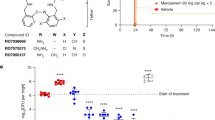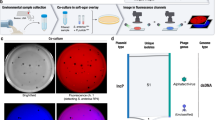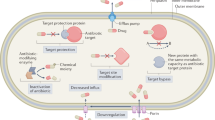Abstract
IN a previous paper1 we have reported that many strains of Staphylococcus aureus elaborate a diffusible extracellular lipolytic substance that produces visible lipid plaques on plasma agar, often in large amounts.
This is a preview of subscription content, access via your institution
Access options
Subscribe to this journal
Receive 51 print issues and online access
$199.00 per year
only $3.90 per issue
Buy this article
- Purchase on Springer Link
- Instant access to full article PDF
Prices may be subject to local taxes which are calculated during checkout
Similar content being viewed by others
References
Weld, J. T., Kean, B. H., and O'Leary, W. M., Proc. Soc. Exp. Biol. Med. (1963).
Mangold, H. K., J. Amer. Oil Chem. Soc., 38, 708 (1961).
Feigl, F., Spot Tests, 2 (Elsevier Pub. Co., New York, 1954).
Elek, S. D., Staphylococcus pyogenes, 290 (E. S. Livingstone, Ltd., Edinburgh and London, 1959).
Author information
Authors and Affiliations
Rights and permissions
About this article
Cite this article
WELD, J., O'LEARY, W. Events associated with Development of Lipid Plaques on Plasma Agar. Nature 199, 510–511 (1963). https://doi.org/10.1038/199510a0
Issue Date:
DOI: https://doi.org/10.1038/199510a0
This article is cited by
-
Importance of the residue Asp 290 on chain length selectivity and catalytic efficiency of recombinant Staphylococcus simulans lipase expressed in E. coli
Molecular Biotechnology (2007)
-
Staphylococcal lipases
Lipids (1974)
Comments
By submitting a comment you agree to abide by our Terms and Community Guidelines. If you find something abusive or that does not comply with our terms or guidelines please flag it as inappropriate.



